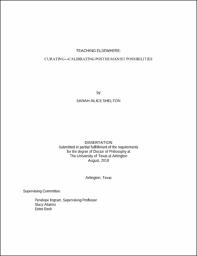
ATTENTION: The works hosted here are being migrated to a new repository that will consolidate resources, improve discoverability, and better show UTA's research impact on the global community. We will update authors as the migration progresses. Please see MavMatrix for more information.
Show simple item record
| dc.contributor.advisor | Ingram, Penelope | |
| dc.creator | Shelton, Sarah Alice | |
| dc.date.accessioned | 2020-08-04T18:27:23Z | |
| dc.date.available | 2020-08-04T18:27:23Z | |
| dc.date.created | 2018-08 | |
| dc.date.issued | 2018-08-28 | |
| dc.date.submitted | August 2018 | |
| dc.identifier.uri | http://hdl.handle.net/10106/29333 | |
| dc.description.abstract | Following the material and ontological turns and working within the recent conversation applying posthumanist theory to education and educational research, this dissertation argues that professors can materialize immediate, critical differences for our students—open up different possibilities for their knowing-in-being than the ones imposed on us by a humanist education system—by “teaching elsewhere” even while staying within the college classroom spaces (designed to be “anywhere”) we’re assigned. Such a posthumanist praxis or pedagogy relies on Karen Barad’s agential realism to see “the classroom” as the entire spacetimemattering of a particular phenomenon brought together through a mixture of choices and impositions into intra-action. Diffracting Barad’s use of Niels Bohr’s light paradox through Donna Haraway’s concept of “elsewhere” as a speculative “absent, but perhaps possible, other present” (“Promises” 295), and through the humanist narratives (the fall, return, recuperation) that “back-to-basics” educational policies depend on, elsewhere becomes the classrooms (phenomena) we can create here and now, even among such policies (nowheres) and physical classrooms (anywheres).
Developed by diffracting theory and fiction (particularly Margaret Atwood’s MaddAddam trilogy) through the teaching of two sophomore level English literature courses, curation↔calibration is a way of creating the possibilities for and of observing such elsewheres. Through curating—texts, objects, people, places, concepts, experiences, activities, artifacts etc.—with the classroom (from the whole phenomenon) instead of pre-planning everything ourselves, we can calibrate for more posthumanist possibilities. This requires, however, intentional and sustained observation (similar to teacher inquiry but through a posthumanist framework) to notice the dynamic flows of agency throughout all actants in the classroom-as-phenomenon—human and nonhuman alike. Such teaching↔as↔inquiry—in this project through pedagogical documentation and diffraction—drives curation↔calibration as a continual doing (and a continual undoing of humanist habits and assumptions) that holds us responsible for and accountable to each unique, unrepeatable classroom we teach-with. | |
| dc.format.mimetype | application/pdf | |
| dc.language.iso | en_US | |
| dc.subject | Posthumanist pedagogy | |
| dc.subject | Posthumanist education | |
| dc.subject | Posthuman pedagogy | |
| dc.subject | Posthuman education | |
| dc.subject | Posthumanism | |
| dc.subject | Agential realism | |
| dc.subject | Teacher inquiry | |
| dc.subject | Post qualitative inquiry | |
| dc.subject | Pedagogical documentation | |
| dc.subject | Diffraction | |
| dc.subject | Teaching elsewhere | |
| dc.subject | Curation | |
| dc.subject | Calibration | |
| dc.subject | Posthuman educational research | |
| dc.title | Teaching Elsewhere: Curating↔Calibrating Posthumanist Possibilities | |
| dc.type | Thesis | |
| dc.degree.department | English | |
| dc.degree.name | Doctor of Philosophy in English | |
| dc.date.updated | 2020-08-04T18:27:24Z | |
| thesis.degree.department | English | |
| thesis.degree.grantor | The University of Texas at Arlington | |
| thesis.degree.level | Doctoral | |
| thesis.degree.name | Doctor of Philosophy in English | |
| dc.type.material | text | |
| dc.creator.orcid | 0000-0002-0750-8590 | |
Files in this item
- Name:
- SHELTON-DISSERTATION-2018.pdf
- Size:
- 7.572Mb
- Format:
- PDF
This item appears in the following Collection(s)
Show simple item record


